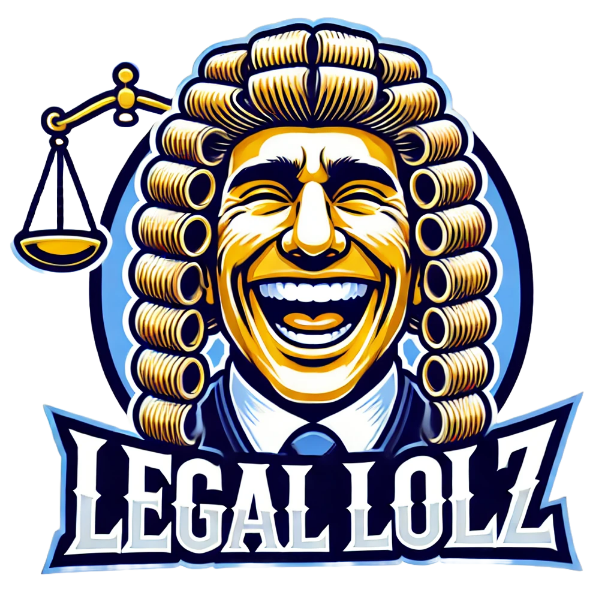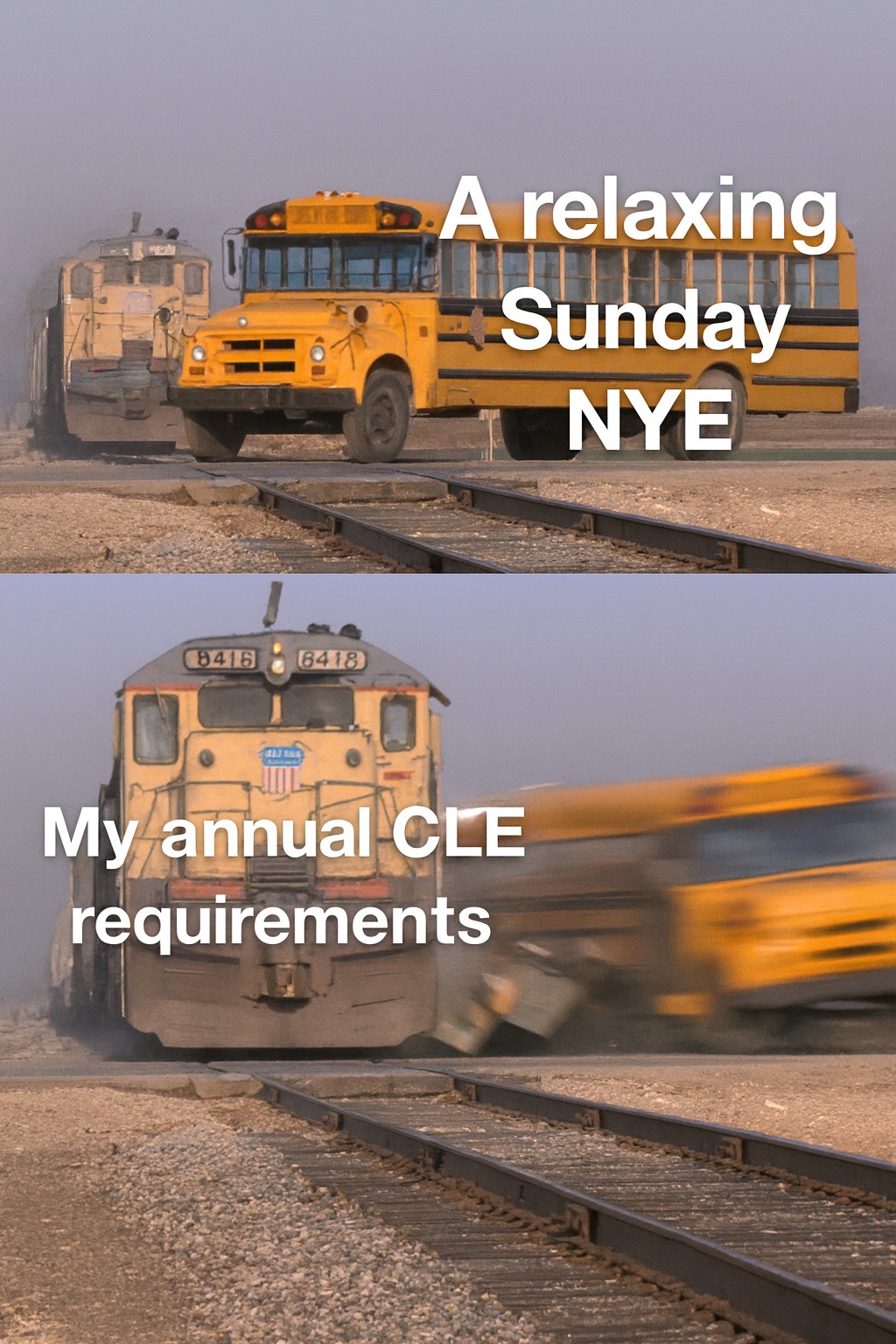


Hello Legal Eagles, Counselors of Chaos, Defenders of Deadlines,
Your weekly dose of legal absurdity, courtroom chaos, and mandatory fun, now with extra billable hours.
Let's get into it! ⚖️😂
Benjamin Franklin once said only two things are certain: death and taxes. Franklin clearly never practiced law, because he forgot the third certainty: CLEs.
That's right, attorneys. You survived law school. You conquered the bar exam. You're billing 2,200 hours annually while your personal life crumbles like a poorly drafted contract. You've made partner, or name partner, or you're a literal rainmaker who brings in eight figures annually. None of it matters.
The State Bar wants their 12-15 hours of compliance theater, and they want it NOW.
CLEs are the universe's way of reminding lawyers that no matter how successful you become, you'll still spend a Tuesday afternoon in a hotel conference room learning about updates to Rule 11 sanctions while eating stale croissants and questioning every life choice that led you here.
Senior partners who haven't personally drafted a motion since 2003? Required. Federal judges with lifetime appointments? Many jurisdictions say yes. That 80-year-old solo practitioner who only handles uncontested wills for her church friends? Absolutely required.
The only people exempt from CLEs are the dead and the disbarred. And honestly, some days the disbarred seem like they got the better deal.
Let's examine what makes CLEs the professional development equivalent of a root canal:
The Venue: A windowless hotel conference room that hasn't been updated since 1987, or a Zoom call where half the attendees are clearly doing other work and one person hasn't figured out how to mute.
The Catering: Coffee that tastes like it was brewed during the Carter administration. Muffins with the density of legal treatises. A sad vegetable tray that nobody touches except that one health-conscious associate everyone secretly resents.
The Presenter: Either a brilliant practitioner who cannot teach, or a professional CLE speaker whose resume lists "Engaging Presenter!" twelve times. Neither has updated their PowerPoint since 2015. Comic Sans may be involved.
The Material: Information you either (a) already know, (b) will never use, or (c) could Google in thirty seconds when actually needed. Delivered at a pace that makes paint-drying seem thrilling.
The Attendance Verification: A sign-in sheet, a unique code revealed halfway through, or a random quiz question to prove you were conscious. Because nothing says "professional development" like treating attorneys like high schoolers playing hooky.
Your Actual Attention Span: Approximately 11 minutes before you start reviewing emails, billing time to other matters, or contemplating whether "of counsel" means you can retire from this circus.
Forget boring ethics updates. Here are the courses lawyers ACTUALLY need:
3.0 CLE Credits (Ethics? Questionable)
Learn to clock billable hours for time spent:
Faculty: A BigLaw partner who bills 3,200 hours annually and hasn't seen their children awake since 2019.
2.0 CLE Credits (Trial Practice)
Master the art of:
Faculty: A federal public defender who has seen some THINGS and lived to tell about it.
4.0 CLE Credits (Professional Responsibility)
Topics include:
Faculty: A matrimonial attorney who has seen people fight over used kitty litter out of spite.
5.0 CLE Credits (You'll earn every minute)
Hands-on training in:
Bonus module: Advanced techniques for staying awake during your tenth hour of email review. Featuring guest appearance by whatever unholy energy drink is keeping you alive.
Faculty: A commercial litigator whose screen time report would horrify their optometrist.
1.0 CLE Credit (Technology)
Learn to:
Guest lecturer: Every attorney who has accidentally left a filter on during a court hearing. Yes, we're looking at you, cat lawyer.
1.0 CLE Credit (Ethics - Required)
Real talk about:
Warning: This course walks right up to ethical boundaries, stares them in the face, and then backs away slowly. Probably.
Faculty: An attorney who has been reported to the bar three times and cleared three times. They know where the lines are because they've tap-danced on them.
2.0 CLE Credits (ADR/Settlement)
Advanced techniques including:
Faculty: A mediator who has seen every dirty trick and is here to teach them all.
3.0 CLE Credits (Appellate Practice)
Master the craft of:
Faculty: An appellate specialist whose oral argument once made a circuit judge say "Counsel, are you suggesting we were wrong?" and they said "Yes, Your Honor" and somehow won.
Meet CoCounsel — the GenAI built for lawyers who've had enough of "AI hallucinations."
From research to drafting to document review, CoCounsel uses trusted Thomson Reuters content to do the grunt work (without making stuff up). More work done. Less caffeine required.
REQUEST DEMODISCLAIMER: Legal LOLz does not endorse any of the following tactics. We're simply reporting on strategies that definitely exist in the wild, allegedly, per sources we cannot name, in jurisdictions we won't identify, among attorneys who totally aren't reading this right now.
Deploy a junior associate or paralegal to sit through the CLE while you handle "urgent client matters" (golf). Provide them with your bar number and a very detailed description of your appearance in case of verification. Have them take notes you'll never read but can produce if audited.
Success Rate: 60%
Risk Factor: Medium (What are they going to do, cross-reference the sign-in sheet with facial recognition?)
Ethical Violation Level: Moderate to severe
Actual Consequences: Probably none, but wouldn't recommend putting this in writing. Oh wait.
Obtain a note from your physician stating that you were incapacitated by:
Some jurisdictions allow medical extensions. Some even accept mental health reasons, which is ironic given that mandatory CLEs are a mental health issue.
Success Rate: 70% (if you have an understanding doctor)
Risk Factor: Low (medical privacy is real)
Ethical Violation Level: Depends on how creative your doctor gets
Pro Tip: Therapists are often more sympathetic to "mandatory CLEs are triggering my burnout" than you'd expect
Get admitted in multiple states. When State A asks about your CLE compliance, you were "focusing on maintaining State B requirements." When State B asks, you were "prioritizing State A." They rarely compare notes.
Also, move to a state with reciprocity and claim you completed the requirements in your original jurisdiction. The administrative burden of verification is someone else's problem.
Success Rate: 55%
Risk Factor: High if they actually check
Ethical Violation Level: Significant
Consequences: Getting suspended in multiple states simultaneously would be impressive in a terrible way
Many jurisdictions waived or reduced CLE requirements during COVID. Continue claiming pandemic-related hardship well into 2025. You're still recovering. Mentally. From the collective trauma. That definitely prevents you from watching a 90-minute webinar.
Success Rate: Decreasing rapidly but worth a shot
Risk Factor: Medium
Ethical Violation Level: Low (more sad than unethical)
Reality Check: This stopped working in 2023 but we respect the hustle
Switch your status to "inactive," "retired," or "of counsel" to avoid requirements. Continue practicing law under another attorney's supervision (wink wink). Technically you're not practicing independently. Technically.
Success Rate: 40%
Risk Factor: Very High (unauthorized practice of law is a real problem)
Ethical Violation Level: SEVERE
Consequences: This is how you speedrun a disbarment hearing
Sign up for recorded webinars. Play them at 2x speed while doing actual work. When the verification code appears on screen, tab back over and enter it. You've now completed 8 hours of CLE in 4 hours while actually billing those 4 hours to clients.
Is this technically fraud? Philosophically speaking, if you absorbed none of the information but can prove you were technically present, have you committed a crime or just optimized a broken system?
Success Rate: 85%
Risk Factor: Low (they can't prove you weren't paying attention)
Ethical Violation Level: Moderate (but who's checking?)
Actual Practice: This is just what everyone does now
Be so senior that nobody wants to enforce the rules against you. Name partners who bring in $5M annually rarely get aggressive CLE compliance letters. The Bar knows who pays the bills.
Success Rate: 95% (if you're actually that important)
Risk Factor: Zero (they need your dues more than you need their approval)
Ethical Violation Level: It's not unethical if the rules don't apply to you
Accessibility: Extremely limited (must already be successful to use this strategy)
Just... don't do them on time. Wait for the reminder letter. Then the second reminder. Then the "FINAL NOTICE" that's never actually final. Pay the late fee (if any). File a request for extension. Get the extension. Miss that deadline too.
Eventually complete them so late that the next cycle is starting, meaning you're perpetually one cycle behind, which somehow feels more manageable than being current.
Success Rate: 90% (administrative systems are held together with duct tape)
Risk Factor: Low (they're too understaffed to chase you aggressively)
Ethical Violation Level: Minimal (you're going to do them, just... eventually)
Psychological Cost: High (the guilt follows you)
Here's a radical strategy that 100% works: just do the CLEs.
Yes, they're tedious. Yes, you already know most of it. Yes, the hypocrisy of forcing practicing attorneys to prove they're staying current is rich when half the presenters haven't seen a courtroom since the Reagan administration.
But consider:
Plus: Once they're done, you get a full year of not thinking about them. That's called "peace of mind," and it's billable to your own mental health at $0/hour but worth every penny.
CLEs are the legal profession's way of ensuring that even the most successful among us remember we're all still students at heart. Students who resent being treated like students. Students who could be billing these hours. Students who are definitely checking our phones right now instead of paying attention to this very important ethics update.
But here's the thing: every attorney in America is dealing with the same bureaucratic nonsense. Your law school rival who's now a federal judge? Still doing CLEs (probably). That insufferable gunner from 1L? Suffering through the same webinars. The senior partner who makes you feel inadequate? Also forgot to do their ethics requirement and is panicking about the deadline.
We're all in this together, counselors.
So grab your stale muffin, pour your terrible coffee, sign that attendance sheet, and endure these next few hours with the quiet dignity of someone who has survived worse (law school finals, bar exam, first deposition, reading your own old briefs from year one).
And remember: in most states, you can claim a bathroom break without losing credit.
Use that information wisely.
Motion to Adjourn Granted.
Until next time,
Walter, Editor-in-Law
(Current on CLEs. This year. Probably. Don't check.)
MANDATORY DISCLAIMER: This newsletter is satire and not actual legal advice on evading professional requirements. Legal LOLz does not endorse CLE fraud, using interns as body doubles, or any strategy that would result in bar discipline. We're just saying these things happen. Allegedly. In Minecraft. Consult your own conscience and risk tolerance.
SECOND DISCLAIMER: If you're a bar association compliance officer reading this, it's all fictional. Pure comedy. No attorneys were harmed or inspired to commit professional violations in the making of this newsletter. Please don't audit us.
THIRD DISCLAIMER: If you actually skipped CLEs because of this newsletter and got caught, that's a you problem. We're comedians, not your ethics counsel.
PS: Share this with 3 colleagues also dreading their CLE deadline. Misery loves company, and so does the Bar.
Let's face it, another "proud to be attending a conference" post isn't going to land your law firm new clients.
What will? A featured quote in a national publication. A guest spot on a legal podcast. A story about your courtroom win in a business journal.
JustReachOut gives you the tools to get yourself featured - no press release needed, no gatekeepers involved.
You bring the expertise. They bring the mic.
Start pitching like a pro.
TRY FREEThe Renewable Rube Ruse:
BigLaw titan King & Spalding needs a junior-to-mid-level associate who can juggle project finance, acquisition finance and enough acronyms (ISDA, EEI, tax-equity) to fill a Scrabble board. You'll advise sponsors on big-ticket renewable and conventional power projects, decipher cash-waterfall charts and run closings like a seasoned notary. Translation: you'll become the human spreadsheet that keeps billion-dollar deals from collapsing into renewable rubble.
The Grounded Reality:
Location flexibility means you can freeze in New York or ski in Denver. The salary range ($260,000–$365,000) sounds sweet until you realize you're billable for every waking hour. Expect to explain "project finance" to your relatives every Thanksgiving and to fall asleep reading credit agreements printed in eight-point font. But hey, you'll have bragging rights when someone asks, "So who exactly builds wind farms?"
The FinTech Fun-Factory:
Adyen (the payments giant behind transactions for Meta, Uber and H&M) needs a corporate counsel to wrangle vendor agreements, partnership deals and bespoke tech contracts. You'll advise senior stakeholders, draft default notices and pretend "early-stage dispute resolution" isn't just code for stopping salespeople from promising the moon. You'll also liaise with colleagues in the Netherlands because everything sounds cooler when you can say "my team in Amsterdam."
The In-House Reality:
The job is based in New York, with a salary range of $160,000–$212,500. There's no billable-hour requirement, but there is the expectation that you'll be on call whenever a contract combusts. The role suits lawyers with four-plus years of experience who secretly enjoy being the adult in the room. If you're ready to swap partner meetings for boardrooms and trade court filings for fintech jargon, Adyen offers the rare chance to be an in-house hero (or at least to stop tracking time in six-minute increments).
The Mortgage Mosh Pit:
Kelley Drye's Real Estate Practice Group is hunting for a senior-level associate or Special Counsel who can run deals like a conductor on a high-stress mortgage symphony. You'll represent lenders in the origination, purchase, sale, securitization, refinancing and restructuring of mortgage and mezzanine loans; negotiate co-lender and intercreditor agreements like a couples' therapist for banks; and juggle multiple transactions at once without spilling coffee. Candidates need at least six years of commercial mortgage finance experience, strong analytical abilities and the ability to keep clients happy while explaining what "mezzanine" actually means.
The High-Rise Reality:
The salary range is $300,000–$355,000 - enough to buy your own mezzanine, but also enough to fund your future stress-management program. You'll be based in New York, New Jersey or Connecticut, working across office lines with a hybrid schedule. Benefits include health and life insurance, disability income protection, paid parental leave, retirement savings, college coaching, child and elder care programs and more. In other words, you'll need all that support when you're up at 3 a.m. wrangling co-lender agreements while the client asks if you can "just explain the rate cap one more time."

Objection? Hit reply and argue your case!
Your inbox is full of legal briefs and client rants. Let Legal LOLz be the newsletter you actually look forward to reading.
P.S. This newsletter is 100% billable if you read it on the clock. Just saying.
Walter, Editor-in-Law
(Still not disbarred. Yet.)
© 2025 All rights reserved. Sharing is cool. Stealing? That's a tort, not a tribute.